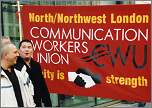AT THE start of a new year, PETER TAAFFE, general secretary
of the Socialist Party, says that working people in Britain are likely to face
a new period of struggle and political ferment in 2004.
 IN THE past year, Britain entered a period of upheaval and
IN THE past year, Britain entered a period of upheaval and
turbulence.
There were huge antiwar demonstrations which convulsed Britain and
the world – compelling the New York Times to comment on the emergence of a
"new superpower" – together with the rise in militancy and strikes in
industry.
Years of accumulated anger suddenly burst out in the
so-called ‘wildcat’, unofficial action by Heathrow Airport check-in staff. This
was followed by the tremendous spontaneous action by the postal workers. In one
mighty sweep Thatcher’s vicious anti-union laws, shamefully upheld by Blair’s
New Labour government, were pushed aside.
If the trade union leaders possessed one-tenth of the
determination of these workers then these laws would be already a dead letter.
Instead, the union leadership – including, unfortunately, some of the so-called
‘awkward squad’ – act like Rabbie Burns’s "timorous beastie" in
shamefully acquiescing to these laws.
This new mood results from a boiling anger amongst working
people at the virtual ‘reign of terror’ – in effect, a semi-dictatorship of
capital in the workplace. Tony Woodley, the newly-elected General Secretary of
the Transport and General Workers’ Union, reflected this when he called for
action against the bosses.
 Woodley said:
Woodley said:
"The only thing that talks louder than
money is the united voice of mobilised people," [The Guardian, 8 December
2003].
Unfortunately, he then went on to argue that "Government tax and
economic aid policies should do more to reward the good investor and punish the
bad."
The implication is that a solution must be sought to the
pressing problems of working class people from the ‘good capitalists’ rather
than the bad ones. But capitalism is a system based upon production for profit
not social need.
Of course, working people, through their trade unions, must
use their power to defend their conditions and rights and fight for
improvements. But there must be no illusions that ‘good’ investors, read
capitalists, can solve their problems as opposed to ‘bad’. All capitalists are
motivated to maximise their profits at the expense of the working class.
Economic recession
YET, ACCORDING to the regular sermons of Gordon Brown,
Britain has tamed capitalism and avoided the economic perils of recession,
unlike Europe, Japan and the US. On the surface, it appears as though there is
a relatively ‘benign’ economic situation in this country, with unemployment
officially at a 28-year low.
This statistic does not take account of hidden
unemployment. New Labour, like the Tories before them, have massaged the
figures and concocted a whole series of ‘make-work’ measures to remove the
long-term unemployed from the register; millions have been shifted to the
disabled category.
Moreover, employment growth has tended to concentrate
around the south-east hub and other ‘bright’ conurbations. But the reality
below the surface is that poverty, in all its guises – deprivation, the gap
between rich and poor – has worsened under New Labour’s rule.
The UK has the worst poverty in the European Union, the
longest working hours and the lowest ‘social spending’. Three times more UK
children fall beneath the poverty threshold than in 1970. A tenth of the
population received pay rises averaging 7.3% last year, while the bottom tenth
got 4.5%.
Manufacturing industry has collapsed, from seven million
employees in the 1970s, when it accounted for 40% of domestic product, to 3.5
million today, now less than 20% of the economy. In the next period, all areas
of Britain, with the possible exception of South-west England, are expected to
suffer job losses.
British capitalism now exists not on improving production
techniques but on low-paid labour. In this way, more value is squeezed from the
labour of the working class. Investment collapsed last year, as did foreign
direct investment which, in the 1990s, helped sustain British capitalism by
plugging the gap left by the collapse of industry.
However, the comfort blanket of the growth in services to
replace manufacturing has now been snatched away, as big business ‘relocates’
jobs in the service sector to Asia and Eastern Europe. 50,000 call centre jobs
have gone in the last two years, with an estimate of two million banking and
insurance jobs out of 13 million destined to follow.
 The ‘sucking sound of jobs disappearing’ from Britain has
The ‘sucking sound of jobs disappearing’ from Britain has
even alarmed the CBI and produced panic stations in the government. But is this
not an expression of the ‘free market’ extolled by Blair and Brown?
Workers in the countries to which these jobs are going
receive one-tenth of the wages of the workers they have replaced. Even if
British capitalism was capable in the medium and long-term of plugging the
‘jobs gap’ left by the outsourcing of hundreds of thousands of jobs abroad, the
net result for British workers, particularly the low paid, would be fewer job
opportunities and, in general, a lowering of wages and conditions.
A nice earner
LIKE THE US, the British workforce is in danger of becoming
‘hamburger flippers’ on the basis of diseased capitalism. High-paid, high
technology employment is to be replaced by low-paid, sweated labour.
However, out of such combustible conditions can come a
resurgent working class and labour movement fightback. The long-term, even
medium-term, future is dim indeed for British capitalism and, on that basis,
for the working class as long as this system is maintained.
In desperation, the British capitalists, led by Blair and
Brown of course, have a half-formed idea that the continued prominence of the
City of London in finance can now be linked to the expansion of the education
and health sectors as foreign ‘earners’ for Britain. This idea partly fuels the
Blairites’ drive for the speeding up of privatisation and the development of a
two-tier health service.
It is also the central economic idea behind ‘top-up’ fees.
Blair has made it clear that the ‘variable’ element is ‘non-negotiable’ for the
very reason that this is a key for the development of the British equivalent of
the US’s ‘Ivy League’ elite universities.
Annual fees will start at £3,000 but some could rapidly
increase to £15,000 or even £20,000. This is against the background of recent
figures which show that very few working class young people make it to Oxford
or Cambridge Universities.
However, Blair’s top-up fee proposals have infuriated not
just sections of the middle class but workers as well. They see the limited
opportunities provided in the post-1945 boom – where sons and daughters of
working-class families could make it to university for the first time – being
snatched away by this government.
Over 100 Labour MPs are threatening to vote against the
government, which could bring down Blair. If they are bought off by
mealy-mouthed ‘concessions’ then they could face the wrath of the electorate,
particularly in marginal constituencies at the next election. It is clear that
the social-democratic dream of a ‘ladder of opportunity’ provided by education
has been shattered by Blair and Brown.
Market rules – we pay
THE WORKING class has been given a harsh lesson in the
realities of capitalism under New Labour, as with the Tories before. It is
destined to become worse under the baton of Brown. In his pre-Budget statement
in December he admitted that the deficit in the public finances would balloon
to £37 billion, compared to the £10 billion he estimated only a year ago.
This means cuts in the public sector, which can take the
form of tax increases, possibly of a disguised kind, and direct cuts. Brown is
desperately trying to delay these until after the next election – possibly in
18 months time – but cuts are coming.
 This is on top of the increases in council tax, now almost
This is on top of the increases in council tax, now almost
as unpopular as the poll tax under the Tories. Cuts in council spending could
drastically impact on education and other vital services. Yet Britain still
suffers from the sado-monetarism of Thatcher, when social spending was savagely
cut in order to pay for tax cuts for the rich.
New Labour has presided over "the lowest public sector
investment, since the Second World War, according to an Observer/Institute of
Fiscal Studies analysis." [The Observer, 14 December 2003]
The consequences of this are evident in the collapse of the
infrastructure. Sewers are collapsing, power cuts have taken place and will
increase in frequency in the future, and there will be gas explosions and
problems including water shortages.
The most blatant example of this catastrophic neglect and
privatisation is on the railways. They have not been completely re-nationalised,
primarily for ideological reasons. If such a step was taken it would shatter
the New Labour mantra that ‘state ownership does not work’.
Also, half-owned state railways can still be exploited by
the privateers to milk them of exorbitant profits. Nevertheless, this patent
failure and partial re-nationalisation is of ideological significance. It has
shattered the illusion that ‘the market’ is the only provider of effective
goods and services.
The British working class, with the longest working week in
Western Europe, is set to revolt against the New Labour government’s continuing
opt-out from the EU working time regulations, which limit the working week to
48 hours.
Four million British workers currently work longer than the
48-hour ceiling, and about 1.6 million of them are not paid for their overtime.
Research has shown "the link between heart disease, stress and long
hours". [The Guardian, 1 October 2003]
As in 2003, this is preparing the ground for a massive
upsurge of the working class, not just on wages but in the future on the issue
of cutting the working week.
Resisting ‘neo-liberalism’
HOWEVER, THE key to harnessing the new mood which is
developing, is programme, organisation and leadership. The election of the
left-wing ‘awkward squad’ represented a big step forward for the trade union
movement compared to the right-wing leaders who preceded them.
However, the industrial and political limitations of many
of this ‘awkward squad’ have been recently highlighted. Some are hesitant about
leading workers into action and have an almost fatalistic attitude that
privatisation cannot be defeated. It could be defeated by a mobilised working
class and labour movement.
The neo-liberal offensive can be resisted, as the general
strikes in France, Austria and Italy have demonstrated. Britain is no
exception: the anger is tremendous at the robbery which has taken place on the
issues of pensions, wages and other conditions.
Brown has also signalled a further impoverishment of public
sector workers by replacing the Retail Price Index as the main measurement of
inflation with ‘HICP’ (the Harmonised Index of Consumer Prices – the
measurement of inflation used in the euro zone), which will effectively fiddle
the figures for inflation in Britain as it determines wage agreements.
The ‘awkward squad’ possess a similar, in some senses
worse, lack of confidence on the political terrain. Some cling to the false
notion that Labour can be ‘reclaimed’.
This at a time when Labour is moving even further to the
right; 63% of the delegates at the Labour Party conference did not even want to
discuss the Gulf War. George Galloway has been expelled, despite the opposition
of Michael Foot, Tony Woodley and Tony Benn.
Bob Crow, for instance, can support the disaffiliation of
the rail workers from the Labour Party in Scotland and their affiliation to the
Scottish Socialist Party, which is a big step forward. But at the same time he
has stressed that the RMT "still remains affiliated" to the Labour
Party nationally.
 Why? New Labour is no different in England and Wales than
Why? New Labour is no different in England and Wales than
in Scotland. The need for a new mass workers’ party has never been greater. The
proposed ‘Respect Unity Coalition’, an alliance of George Galloway, the
Socialist Workers Party and non-socialists like George Monbiot, is
unfortunately not yet that alternative. It is not based on a clear class
analysis or programme, nor does it propose a clear socialist alternative to
Labour.
The authors of this project did not consult the Socialist
Party or others on the left. This despite the splendid victory in Lewisham
where the Socialist Party had our second councillor elected, bringing the
number of elected Socialist Party councillors nationally to five.
We will give critical support to all genuine socialists
standing in elections who seriously oppose New Labour and fight for a socialist
alternative. But this is not unqualified. Moreover, neither we nor ordinary
working class men and women, particularly the trade union rank and file, will
acquiesce to a top-down proposal that has not been agreed upon in the course of
discussion and debate.
A new workers’ party
THE NEED to create a new, mass socialist alternative is
urgent. The BNP are competing to fill the vacuum that exists, helped by the
modern ‘Herod’, David Blunkett, who threatens to take away the children of
asylum seekers.
British society is at a crossroads. If Blair is replaced by
Brown this could foster illusions that Labour is in the process of being
‘reclaimed’ by the social-democratic ‘sleepers’, who will allegedly come out
into the open. In reality, however, the character of the Labour Party will not
be changed by this. Nor will illusions in Brown last for any length of time.
The combination of big events with an initiative by a
leading figure or figures calling for a new party or pre-party will find a big
echo in Britain at the present time. We stand for the maximum unity of the left
and are prepared to form electoral pacts with others. But we will not repeat
the experience of the Socialist Alliance, which has declined, as we predicted,
into not so much an SWP ‘front’ but into the SWP.
The new period that has opened up in Britain is going to be
one of increased struggle, strikes, mass demonstrations and a general political
ferment. Above all, it will provide an opportunity for raising the level of
understanding of working-class people and particularly young people in the
ideas of socialism, which is a key to a new Britain and a new world.







